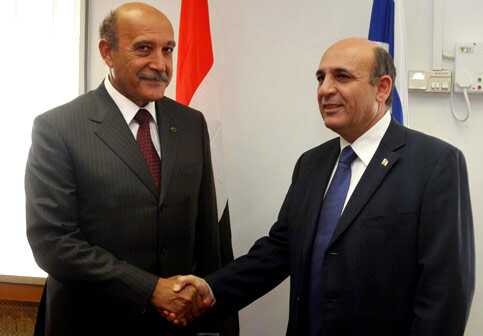The Electronic Intifada 31 March 2007

Rosier days: In 2005, Egyptian Intelligence Chief Omar Suleiman meets with Israeli Defense Minister Shaul Mofaz in Jerusalem. (Inbal Rose/MaanImages)
CAIRO, Mar 30 (IPS) - Another diplomatic row has erupted between Cairo and Tel Aviv after a documentary film aired on Israeli television in February claimed that Israeli forces had executed hundreds of unarmed Egyptian prisoners of war (POWs) in the wake of the 1967 Arab-Israeli war.
The foreign ministry summoned the Israeli ambassador to express “Egypt’s anger” over the revelations, but critics from across the political spectrum decried the step as inadequate.
“The official reaction is in proportion to the weakness of the government, which has obviously lost much of its international influence,” Hamdi Hasan, spokesman for the Muslim Brotherhood bloc in parliament told IPS.
Israeli Television’s Channel One aired a documentary film Feb. 26 about the Arab-Israeli war of June 1967 titled Unit Shakid. The film made the claim that Israeli soldiers — under the command of current Israeli infrastructure minister Binyamin Ben-Eliezer — massacred some 250 unarmed Egyptian POWs in the immediate wake of the conflict.
Two days later, flagship government daily al-Ahram ran the story. “Israeli television documentary reveals Ben-Eliezer led 1967 massacre of Egyptian prisoners”, the paper’s Feb. 28 edition proclaimed in a front-page headline.
The revelations caused a furore in parliament, with MPs of all stripes — from the ruling National Democratic Party of President Hosni Mubarak to the Islamist opposition — vying to condemn the alleged killings.
In a charged session Mar. 4, parliamentarians demanded expulsion of Israel’s ambassador to Egypt, withdrawal of Egypt’s ambassador in Tel Aviv, cancellation of the 1979 Egypt-Israel peace treaty and the establishment of an international tribunal to prosecute the case.
On the same day, Foreign Minister Ahmed Aboul-Gheit summoned Israeli Ambassador Shalom Cohen, who was told of Egypt’s “deep dismay” over the allegations.
This was the second time in as many months. In early February, the Israeli diplomat was summoned to the ministry where he was informed of Egyptian “displeasure” over alleged Israeli violations against Jerusalem’s Al-Aqsa Mosque.
This was not the first time the issue of Israeli wartime atrocities caused diplomatic turbulence.
In 1995, Israeli television reported that Israeli forces had killed scores of unarmed Egyptian captives in the 1956 Suez War. Shortly afterwards, an Israeli military analyst stated that Israeli soldiers — many under the command of Ben-Eliezer — had killed hundreds of Egyptian POWs in 1967.
But while the Egyptian foreign minister at the time, Amr Moussa, had demanded an investigation into the claims, results have never been forthcoming.
According to the Israeli ambassador, the recent documentary’s claims were simply false. “Not a single captured soldier was killed,” Cohen was quoted as saying in the state press shortly afterwards. “There will be no investigation because there’s nothing to investigate.”
Ben-Eliezer himself reiterated the denial, saying that no Egyptian prisoners had been executed under his command in 1967. While admitting in a statement that his unit had killed a battalion of Palestinian commandos in the Gaza Strip, he stressed that “there were no Egyptians in the area.”
Nevertheless, a planned visit by Ben-Eliezer to Cairo in the first week of March to discuss energy cooperation was reportedly cancelled at the last minute. At the same time, a scheduled trip to Israel by Egyptian intelligence czar Omar Suleiman was also called off.
According to an Egyptian diplomatic source quoted in the state press, the notion of Egyptian officials holding talks with someone “directly implicated in the alleged crime”, a reference to Ben-Eliazer, was “out of the question.”
Despite Israeli denials, the Egyptian Organisation for Human Rights (EOHR), a Cairo-based NGO, urged the foreign ministry to follow up on previous demands for information about alleged Israeli massacres in the 1956 and 1967 wars. On Mar. 5, the EOHR formally requested the establishment of a criminal court to try the accused for war crimes.
A number of demonstrations were held, with protestors demanding the government sever diplomatic relations with Israel. On March 9, some 2000 people demonstrated outside Cairo’s al-Azhar University after Friday prayers. The primary demand was closure of the (Israeli) embassy and expulsion of the ambassador.
Aboul-Gheit told the BBC March 9 that “Egypt will not sever relations with Israel because of this film.” The following day, the foreign minister was savaged by parliamentarians, who called his remark “an insult to Egypt.”
Muslim Brotherhood representative Ahmed Abou Hagee described the minister’s statement as “shameful”. He went on to demand that Aboul-Gheit himself be subject to parliamentary inquiry.
While Aboul-Gheit subsequently said he had been misquoted, critics point out that his remarks remain on the BBC website.
Political observers, meanwhile, say steps are currently under way to collect relevant information about the alleged slayings.
“The government has taken the first steps towards investigating those things revealed in the film,” Mohamed Shaker, deputy chairman of the government-run Egyptian Council for Foreign Affairs told IPS. “Cairo has requested that Israel investigate the issue before appealing to UN organisations.”
Many opposition figures, however, are skeptical that the issue can be settled by way of international arbitration.
“Resorting to international organisations is pointless,” said the Muslim Brotherhood’s Hasan. “Israel doesn’t respect their decisions anyway.”
According to George Abu Saab, professor of international law and an appellate judge for the World Trade Organisation in Geneva, the allegation — if true — represents a war crime “whether it was perpetrated against Egyptians or Palestinians.”
“Egypt can’t freeze its peace treaty with Israel because of security stipulations mandating the presence of international forces,” Abu Saab told IPS. “But Egypt can certainly reassess the degree of its civil, economic and tourist relationships with Israel.”
All rights reserved, IPS – Inter Press Service (2007). Total or partial publication, retransmission or sale forbidden.


